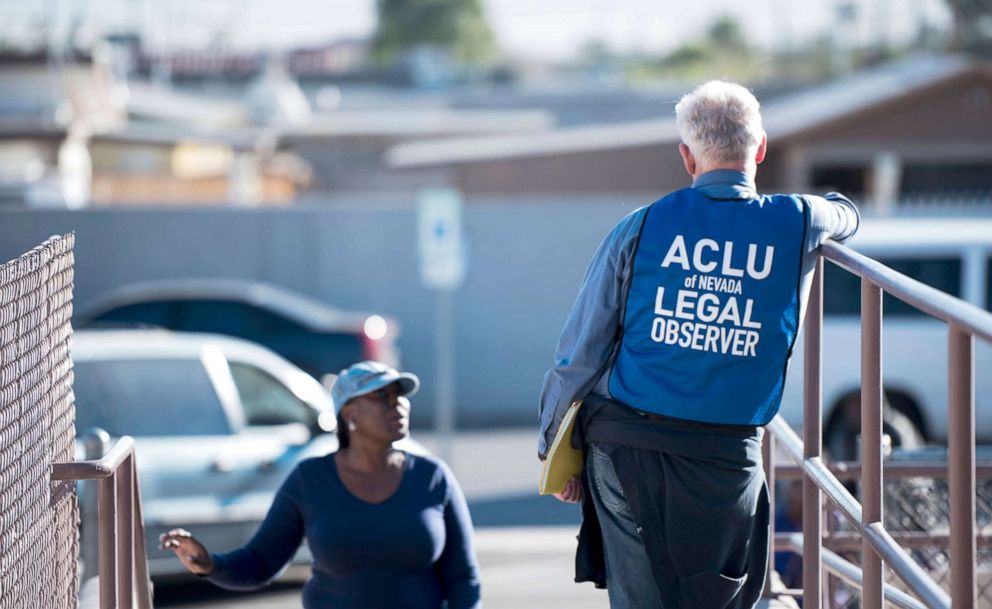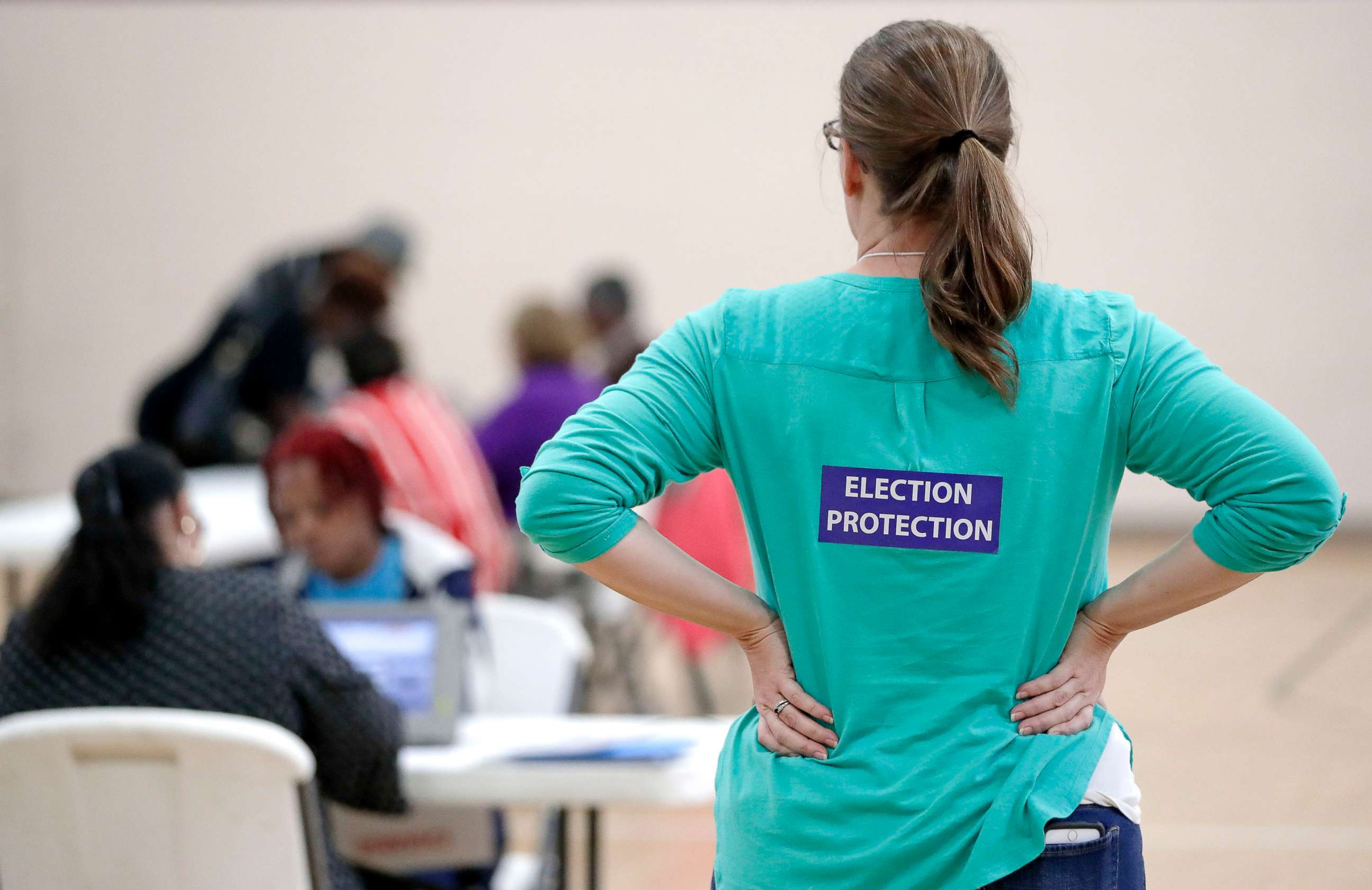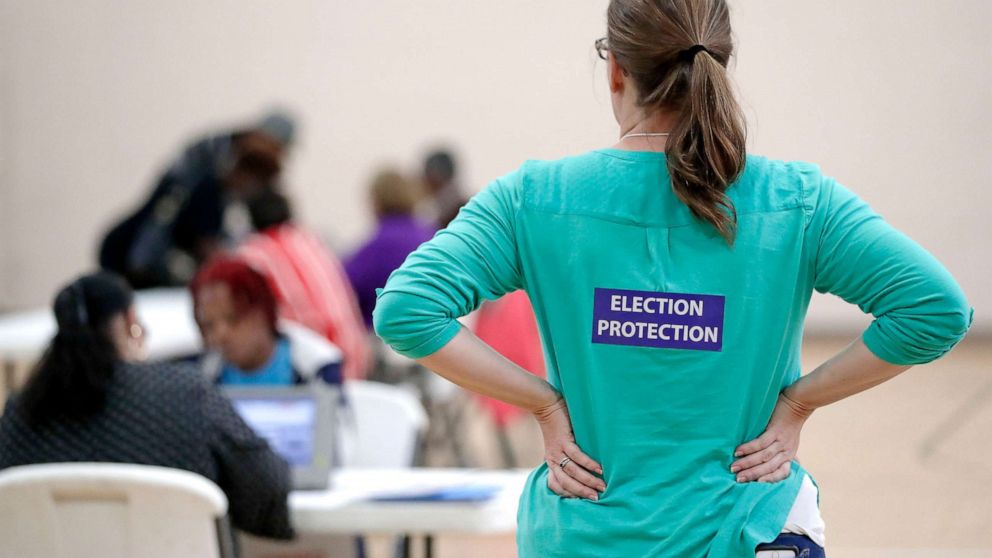What to know about poll watchers in the 2020 election
Poll watchers are a regular feature of elections -- representatives of both sides reporting potential issues with voters to local officials while operating under strict guidelines.
But their potential role in the 2020 race has come under new scrutiny after Donald Trump called on his supporters to flock to polling locations.
During the first presidential debate, President Trump made allegations that poll watchers were blocked from entering voting locations in Philadelphia -- -- an allegation debunked by ABC News fact-checkers. Those "poll watchers" in fact were blocked from entering the early voting sites because certifications to observe the early voting process had not been issued for anyone, including the Trump campaign.

Trump's campaign is organizing Election Day poll watchers in key battleground states and calling the effort "Trump's Army", a force expected to be around 50,000. Critics say that the name of the group sounds militant, but organizers say they will just be quietly eyeballing voters and summoning attorneys when they think something is amiss.
Some have even said the president's rhetoric about poll watchers is a form of voter intimidation. The concern is particularly acute regarding communities of color, which have historically been targeted by voter intimidation.
All of the rhetoric surrounding poll watchers this year has generated confusion and concern about what they can and can't legally do.
According to elections officials and experts, poll watchers aren't merely well-meaning citizens who present themselves on voting day to guard the democratic process; there are trainings and protocols in every state and limits to their authority. And experts say that because of those limits, voters should be vigilant, but not fearful or discouraged from participating.
"When we're talking about a poll watcher from an election administrative point of view, it is a very specific task, one that is rooted in decades of history where primarily people from the two parties -- partisan people -- watch over the shoulders of election officials to make sure that they're [watching over the polling site] according to the law," Wendy Underhill, a director at the National Conference of State Legislatures, told ABC News.
Here's what to know:
What are poll watchers?
Poll watchers monitor elections in most states. From making sure voters who show up to the polls are registered, to enforcing rules and regulations at voting sites, poll watchers' responsibilities can vary by state.
From making sure voters who show up to the polls are registered, to enforcing rules and regulations at voting sites, poll watchers' responsibilities can vary by state. For example, in Pennsylvania, poll watchers are allowed to keep a list of voters.
In Chicago's latest guidance on poll watchers, that permission is not explicitly stated, but Chicago poll watchers can compare signatures in the poll book with the signatures on the ballot application.
Who can be a poll watcher?
Again, statutes vary by state, but in general, poll watchers are appointed by political parties. In New York, for example, poll watchers are appointed by party officials, candidates or independent bodies representing people on the ballot, John Conklin, the public information director of the New York State Board of Elections, told ABC News.
In North Carolina, poll watchers are called "observers" and are appointed by the political parties.
The U.S. Election Commission has a guide detailing who appoints poll watchers and their responsibilities in each state.
What poll watchers can and can't do legally
"Almost every state has some kind of a poll watcher manual that's online," said Underhill. "I think parties often do training for poll watchers to make sure that they know what the law is that they're watching for and that they themselves don't violate any laws around what they can do."
For instance, according to training videos from the Trump camp obtained by ABC News, leaders told trainees to look for potential fraud but not to create a spectacle.
In general, according to the NCSL, poll watchers can closely monitor election administration, keep track of voter turnout for their parties and report issues to polling place authorities and party officials.
Some states including Georgia, North Dakota and South Carolina require poll watchers to wear a badge indicating their name and organization. In New York, poll watchers must be credentialed, but are not required to wear a badge or any identifier at the polling site, Conklin said.

In some states, poll watchers may be able to challenge a voter's eligibility but must do so through an official process.
"There are many limits on who can be poll watchers; how someone becomes a poll watcher, said Eliza Sweren-Becker, the voting rights and elections counsel expert at the Brennan Center. "And we expect those limits to be adhered to. And voters should not be fearful of poll watchers in their polling places ... They should be vigilant but they should not be discouraged from participating in the democratic process."
Poll watchers, across the board, cannot interfere in the electoral process apart from reporting issues, according to the NCSL, nor can they campaign inside any voting precinct or facility, according to the National Association of Secretaries of State.
When poll watching crosses into voter intimidation
Election officials say there is a line between poll watching and voter intimidation, but state laws attempt to guard against the latter.
"There has been a lot of talk about telling people just to show up to the polls to watch, and in Florida, you can't just do that," Hillsborough County Supervisor of Elections Craig Latimer told Fox Orlando affiliate WOFL. "I don't think we are going to have the problems in Florida because we have some great laws around it."
Those who do engage in voter intimidation, on the other hand, "could be putting themselves in legal jeopardy," Ben Hovland, chairman of the U.S Election Assistance Commission, told ABC News.
In Virginia, one day after early in-person voting began, a group of Trump supporters reportedly intimidated voters outside of an early polling location in Fairfax, according to The New York Times.
"I would just say that it's important for people to understand what is and isn't allowed. At the end of the day, we want Americans to participate, we want Americans to be engaged, we want Americans to vote and the things that we can do to help that is something that we should support. But certainly, again, it's important to have transparency and elections but it's important to respect Americans' right to vote and encourage them to do so," Hovland said.
Also this year, for the first presidential election since the 1980s, Republicans will be allowed to send out poll watchers without supervision. They had been barred from doing so because of harassing and intimidating voters in violation of the Voting Rights Act.
According to the American Civil Liberties Union, voter intimidation includes aggressively questioning voters about their citizenship, criminal record or other qualifications, and spreading false information.
Any tactic found to constitute voter intimidation could result in hefty fines and jail time for those taking such action, according to the Department of Justice.
Guns another concern
Another concern is firearms, because some states have open carry laws. Sweren-Becker told ABC News that in those states, using a firearm to intimidate voters would be prohibited.
Only 10 states: Arizona, California, Florida, Georgia, Louisiana, Mississippi, Missouri, Ohio, South Carolina and Texas, plus the District of Columbia and Puerto Rico explicitly prohibit guns and other weapons in polling places, according to the NCSL.
On Friday, Michigan Secretary of State Jocelyn Benson issued a directive that prohibits carrying firearms in the state’s polling places, in hallways used by voters or within 100 feet of building entrances for voters.
In North Carolina, one example of an open carry state, firearms are not prohibited by state law at voting places. But, according to the state’s board of elections in an emailed statement to ABC News, some buildings where polling sites are located may themselves prohibit firearms. And, any use of a firearm for voter intimidation is prohibited.
Law enforcement officials also play a key role in making sure the electoral process goes smoothly on Election Day.
Chief of police in Dearborn, Michigan, Ron Haddad told ABC News his primary duties are to keep peace at the polling places, monitoring them much more closely to ensure that the process goes unimpeded.
"It just seems that there's a lot of anger out there. A lot of conflict over the election. So, we're being very mindful of that … it does seem that people are, to say the least, very high-spirited this election and some people are outright angry. So, we will be monitoring all our polling places much more closely this year," Haddad said.




